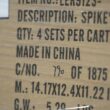The European Union caved to intense pressure from President Trump over tariffs on American-made bourbon and whiskey by exempting the spirits from the list of US imports slated to be hit by new retaliatory taxes.
US bourbons like Makers Mark and Jack Daniels whiskey were initially in the EU crosshairs, but member nations including France, Italy and Ireland successfully pushed for their removal to safeguard their own popular alcohol exports.
President Trump had threatened a 200% tariff on European alcohol imports if bourbon and whiskey were included in the new tariffs passed by Brussels on Wednesday, which were in response to a 25% duty on American steel and aluminum, as well as the 20% reciprocal tariff that was part of the administration’s “Liberation Day” rollout.
“We are not in the business of tit-for-tat or penny for penny,” said Maroš Šefčovič, EU trade commissioner, indicating the EU’s strategic approach.
A revised list obtained from the EU now shows tariffs ranging from 10% to 25% on various products, including poultry, orange juice, and soybeans.
These tariffs will go into effect at different intervals between April 15 and Dec. 1.
Notably, soybeans and almonds have been postponed until December following protests from European farmers reliant on American soybean imports for animal feed.
The original EU proposal would have targeted approximately $28 billion in US goods.
However, the final measures approved are expected to cover about $23 billion.
EU Commission President Ursula von der Leyen expressed continued openness to negotiations, emphasizing that Europe remains ready to eliminate tariffs on industrial goods, particularly automobiles.
“Europe is always ready for a good deal, so we keep it on the table,” she stated.
Germany’s Economy Minister Robert Habeck aired his frustration with the individual lobbying efforts by member states, urging unity and caution in addressing the escalating trade conflict.
“The stock markets are already collapsing and the damage could become even greater,” Habeck warned.
“It is therefore important…to act clearly and decisively and prudently, which means realizing that we are in a strong position. America is in a position of weakness.”
France’s spirits industry welcomed the exemption, having anticipated substantial damage.
The French Wine and Spirits Exporters Association (Fevs) had projected losses nearing $1.7 billion if tariffs on US bourbon and whiskey had been enacted.
“This tariff clash only creates losers, both in Europe and the US,” remarked Fevs President Gabriel Picard.
“Our American counterparts, with whom we have worked for decades, are also conveying this message to American authorities.”
Italian Prime Minister Giorgia Meloni is expected to visit Washington soon, aiming to negotiate reductions in reciprocal tariffs, according to Foreign Minister Antonio Tajani.
In the US, the spirits industry reacted positively to news of whiskey’s exemption.
“This would be great news, and a huge sigh of relief for anxious distillers across the country who were staring down a potential 50% tariff on American Whiskey within just a matter of days,” said Chris Swonger, president and CEO of the Distilled Spirits Council of the United States.
He emphasized the sector’s historic success under zero-for-zero tariffs, calling on the administration to reinstate permanent tariff-free trade, benefiting American farmers, distillers, hospitality workers and consumers.
American whiskey exports to the EU, which suffered a sharp decline following previous EU tariffs imposed in 2018, have rebounded significantly since those duties were suspended, increasing nearly 60% to $699 million in 2024, from $439 million in 2021.








